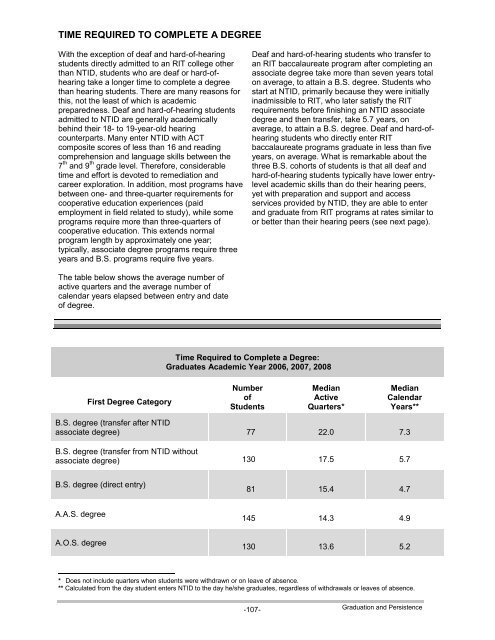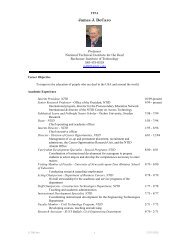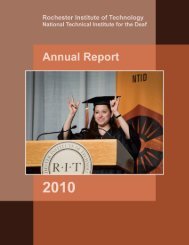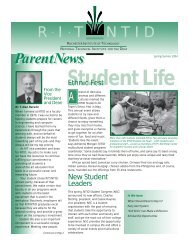Social Security Disability Insurance (SSDI) - National Technical ...
Social Security Disability Insurance (SSDI) - National Technical ...
Social Security Disability Insurance (SSDI) - National Technical ...
Create successful ePaper yourself
Turn your PDF publications into a flip-book with our unique Google optimized e-Paper software.
TIME REQUIRED TO COMPLETE A DEGREE<br />
With the exception of deaf and hard-of-hearing<br />
students directly admitted to an RIT college other<br />
than NTID, students who are deaf or hard-ofhearing<br />
take a longer time to complete a degree<br />
than hearing students. There are many reasons for<br />
this, not the least of which is academic<br />
preparedness. Deaf and hard-of-hearing students<br />
admitted to NTID are generally academically<br />
behind their 18- to 19-year-old hearing<br />
counterparts. Many enter NTID with ACT<br />
composite scores of less than 16 and reading<br />
comprehension and language skills between the<br />
7 th and 9 th grade level. Therefore, considerable<br />
time and effort is devoted to remediation and<br />
career exploration. In addition, most programs have<br />
between one- and three-quarter requirements for<br />
cooperative education experiences (paid<br />
employment in field related to study), while some<br />
programs require more than three-quarters of<br />
cooperative education. This extends normal<br />
program length by approximately one year;<br />
typically, associate degree programs require three<br />
years and B.S. programs require five years.<br />
The table below shows the average number of<br />
active quarters and the average number of<br />
calendar years elapsed between entry and date<br />
of degree.<br />
First Degree Category<br />
Time Required to Complete a Degree:<br />
Graduates Academic Year 2006, 2007, 2008<br />
Number<br />
of<br />
Students<br />
Deaf and hard-of-hearing students who transfer to<br />
an RIT baccalaureate program after completing an<br />
associate degree take more than seven years total<br />
on average, to attain a B.S. degree. Students who<br />
start at NTID, primarily because they were initially<br />
inadmissible to RIT, who later satisfy the RIT<br />
requirements before finishing an NTID associate<br />
degree and then transfer, take 5.7 years, on<br />
average, to attain a B.S. degree. Deaf and hard-ofhearing<br />
students who directly enter RIT<br />
baccalaureate programs graduate in less than five<br />
years, on average. What is remarkable about the<br />
three B.S. cohorts of students is that all deaf and<br />
hard-of-hearing students typically have lower entrylevel<br />
academic skills than do their hearing peers,<br />
yet with preparation and support and access<br />
services provided by NTID, they are able to enter<br />
and graduate from RIT programs at rates similar to<br />
or better than their hearing peers (see next page).<br />
* Does not include quarters when students were withdrawn or on leave of absence.<br />
** Calculated from the day student enters NTID to the day he/she graduates, regardless of withdrawals or leaves of absence.<br />
-107-<br />
Median<br />
Active<br />
Quarters*<br />
Median<br />
Calendar<br />
Years**<br />
B.S. degree (transfer after NTID<br />
associate degree) 77 22.0 7.3<br />
B.S. degree (transfer from NTID without<br />
associate degree) 130 17.5 5.7<br />
B.S. degree (direct entry)<br />
A.A.S. degree<br />
A.O.S. degree<br />
81 15.4 4.7<br />
145 14.3 4.9<br />
130 13.6 5.2<br />
Graduation and Persistence








